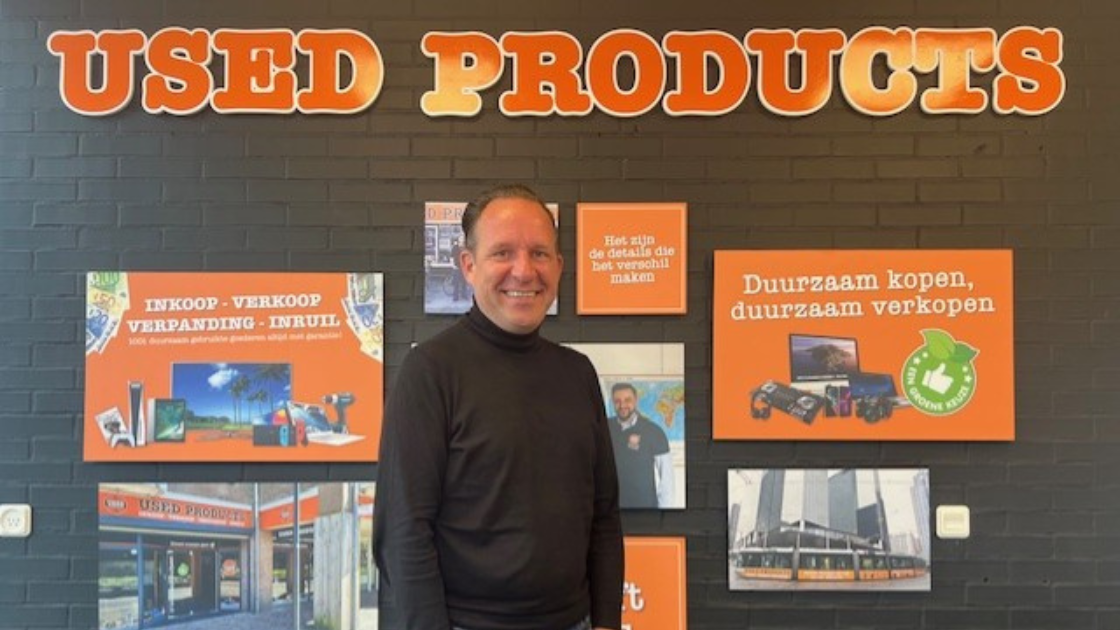Lead the Change: How Used Products is making the circular economy accessible
How can business owners contribute to a more sustainable economy? For Berthold Bakker, co-founder of Used Products, the answer is simple: give products a second life and reduce waste. What started as a commercial venture has grown into a business at the heart of the circular economy, making an ever-growing impact.

From startup to circular economy pioneer
Used Products sells used items, from smartphones to laptops, through physical stores and an online platform. Berthold and a friend opened their first stores in Alkmaar and Zaandam. "We started with just the two of us, running our shops, and slowly expanded into a franchise model." Today, they have 57 stores across the Netherlands and are active in seven other countries.
Berthold admits that sustainability was not a conscious driver in the beginning. “Initially, our focus was primarily on building a profitable business. But in hindsight, our model was a great example of sustainability. Not every product we sell needs to be newly made. That saves a lot of resources and CO₂ emissions."
Sustainable by design
Used Products is all about clever reuse. “Time is money,” Berthold explains. When they receive a broken laptop and see that they can fix it with a new battery and a little work, they make the choice to repair it. It’s commercially smart, but also sustainable.
Sometimes, repairing products isn't worth it. "We have to be realistic. Telling great stories is one thing, but if the sustainable choices you make put your business at risk, it won’t survive."
Within the franchise network, Used Products encourages sustainable decisions, but always considers the practical side. "We advise where we can, but every entrepreneur has their shop, fixed costs, and reality. It needs to remain feasible."
Although the business focuses on extending the life of products, the model itself must also be sustainable financially and operationally for it to thrive long term.
Small choices, significant impact
Used Products also takes extra steps. For example, many stores use sustainable packaging. "We now have sustainable wrapping paper with our logo. It’s a bit more expensive, but it’s a small effort that aligns with our values."
Sustainability is also embedded in the core of their business model, without separate campaigns. "We sometimes talk about it at the office. Honestly, what we do is about as sustainable as it gets. It can be frustrating to see companies promoting sustainability in theory while we are living it in practice, but perhaps we don't do enough to communicate that clearly to the customer," Berthold shares.
A shift in mindset: The rise of second-hand pride
The second-hand market is undergoing a rapid transformation. Berthold says, “Twenty years ago, people often felt embarrassed to buy second-hand. Now, that has completely changed. More and more people, even those who could buy everything new, consciously choose second-hand.”
This shift is not only seen in purchasing behaviour but also customer motivations. Where it was once mainly about selling things to make quick money, Berthold now increasingly hears: “I’d rather see this product reused than tossed out, it deserves a chance at life” A mindset you rarely heard just ten years ago.
Berthold views these changes as a positive development. "Young people are growing up with sustainability as a natural part of their worldview. We’re happy to contribute by making reuse accessible to everyone."
Driven by more than numbers
The strength of Used Products lies not only in the numbers but also in the people behind it. These are entrepreneurs with personal motivations, often deeply rooted in their beliefs.
Berthold shares the story of an entrepreneur who recently started: "She said to me, ‘I have young children, and I believe it's essential to have a business like Used Products. If I ever make extra money from it, that's a bonus. But the most important thing for me is to leave the earth in the best possible shape and show my children how I think one should approach life."
Lead the Change through small steps
For Used Products, the message is clear: every reused phone, laptop, or gaming console makes a difference.
His main advice to other business owners? "It’s possible to combine sustainability with profitability. Sometimes you need to be more creative, but the opportunities are there."
Sustainability doesn't have to be complicated, he emphasises. "Keep it small. Keep it simple. Do what you can, where you can. Every step counts."
At Eevery, we share this belief. Real impact starts with practical decisions, in your operations, among your team, and throughout your supply chain. Our platform helps you gain insights, set goals, and take meaningful steps toward a more sustainable future. Ready to lead the change? Book a meeting today.


.png)
